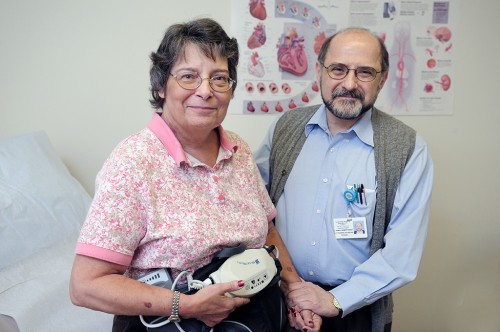Susan Neikens Is First Woman Implanted with an LVAD at a Hospital on Long Island
STONY BROOK, NY, July 6, 2011 — As Susan Neikens, 63, of Mastic Beach, NY, grew weaker and weaker over past year due to advancing heart failure, her treatment options along with quality of life dwindled. But the retired nurse’s cardiologist, James Semertzides, MD, of Long Island Cardiology Associates in East Patchogue, referred her for an evaluation at the Stony Brook Heart Center, where specialists determined she was a candidate to receive a left ventricular assist device (LVAD).
The Stony Brook team implanted an LVAD in Ms. Neikens on April 27, and she became the first woman to receive the lifesaving device at a hospital on Long Island.
“I am breathing much more comfortably, have a higher energy level, swelling has disappeared, have returned to walking, and can do more than I have been able to in years,” says Ms. Neikens, who described these enormous improvements in her health after the LVAD implant as nothing short of a miracle. “Having an LVAD gives me another chance at life and hope for the future.”
“An LVAD is a high-tech device attached to the heart and aorta, inside the body, to assist pumping of the heart’s left chamber,” says Allison J. McLarty, MD, associate professor of surgery, and co-director of SB Heart Center’s ventricular assist device (VAD) program.
“The device represents a new generation of artificial heart technology and can be used as an intermediary step before heart transplantation or to last long-term in patients with advanced heart disease who are not transplant candidates.”
In 2010, the SB Heart Center was the first on Long Island to implant an LVAD in a patient. Specialists through the VAD program have so far successfully implanted five patients with the device.
“Susan’s heart strength was in a stage of rapid deterioration,” says Hal A. Skopicki, MD, PhD, assistant professor of medicine, director of Stony Brook’s heart failure program, and co-director of the VAD program. “Her organs were shutting down and her heart required extraordinary measures to provide the bare minimum of function to just keep her alive. Implanting the LVAD was not only lifesaving but has offered her a markedly improved quality of life every day.”
“Susan was on a path to certain death due to heart failure, but now she has come back to life only to be energized to walk on her own, without much effort, and talk about planning a family trip,” says Dr. Semertzides. “I had tears in my eyes for her upon her examination after the procedure. Thanks to the Stony Brook Heart Center team, their professionalism and expertise with LVADs, new ground is being broken in treating patients like Susan. This provides real hope and a future for patients who otherwise would not have a future.”
According to Ms. Neikens, before deciding to go ahead with the LVAD implantation, she read extensively about the LVAD and even met with patients at the Heart Center who previously had LVADs implanted. After careful consideration and weighing her treatment options, Ms. Neikens says, “I went for it, and I am glad I did.”
Providing Destination Therapy
Dr. McLarty leads Stony Brook’s program in destination therapy, which provides an alternative to heart transplant. She is now treating a growing number of patients who have congestive heart failure with implantation of the newly developed LVAD called HeartMate II.
The HeartMate II, approved by the FDA in 2010 as a permanent implant, consists of a surgically implanted pump attached to an external power source that can be portable and worn on a shoulder strap or belt. The pump takes over the work of the heart’s left chamber that’s become severely weakened as a result of congestive heart failure.
Unlike earlier LVADs that were designed for temporary use, the HeartMate II is for permanent use. This LVAD engineering represents a new generation of “artificial heart” technology that provides end-stage heart failure patients with access to an important new treatment option.
Studies show a significant improvement in quality of life with the HeartMate II compared to conventional medical treatment.
Stony Brook’s VAD program — the first and only VAD program on Long Island that provides destination therapy — has earned national accrediation. Click here to learn more about this “seal of approval.”

